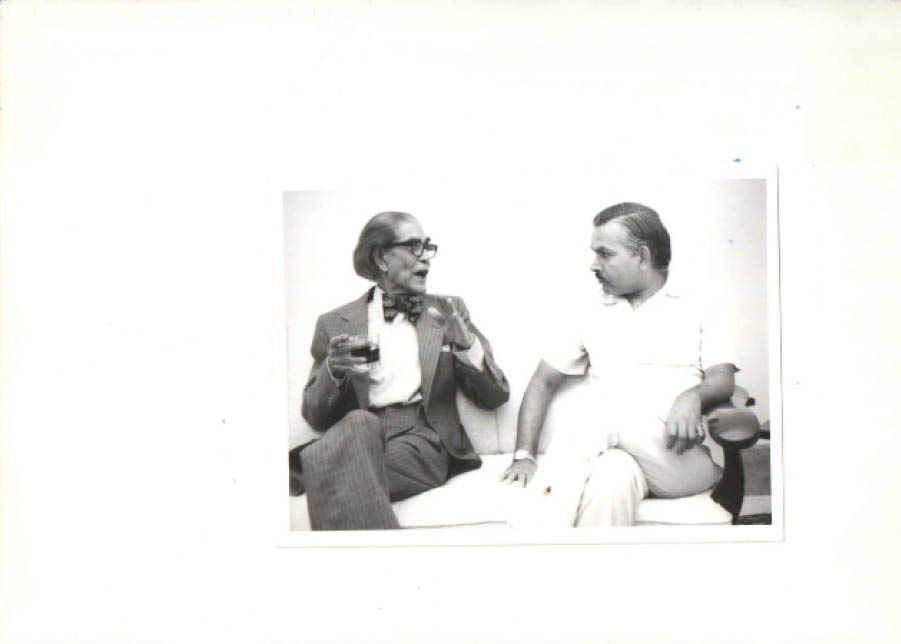Ahmed Ali was a novelist, Urdu poet, scholar and diplomat. He was born in Delhi in 1910.
Ahmed Ali belonged to the generation of Mulk Raj Anand, R.K. Narayan and Raja Rao. All four were born in the first decade of the 20th century.
Ahmed Ali was a novelist, Urdu poet, scholar and diplomat. He was born in Delhi in 1910. He had a brilliant academic career at the Universities of Aligarh and Lucknow.
In 1932, he published in Urdu “Angarey”. It made him famous in the Urdu speaking world. He taught English for brief period at Nanking University in China. When the war ended, he naturally wanted to return to Delhi and look for a job. In his introduction to the Rupa edition of his famous novel, “Twilight in Delhi”, he narrates the reason why he could not return to Delhi. “I was prohibited by the overnight turned Hindu Indian authorities in 1948 to come back to India, and for no other reason than because I was a Muslim. As the ambassador in China, K.P.S. Menon, I.C.S. told me, ‘It is a question of Hindu and Muslim’, when I protested he added, ‘All that I can do is to write to New Delhi, but I can tell you nothing will come of it!’ (I find this incredible) demonstrating a living repetition of history ninety years after the banishment of my grandparents and the Muslim citizens from the vanquished city by the British…’
Ironically, initially the novel was not welcomed in Pakistan, because it was about a “forbidden city”.
Ahmed left for England in August 1939, carrying the manuscript of “Twilight in Delhi”, with him. He showed it to E.M. Forster who liked it. Then problems emerged. Having agreed to publish the novel, the Hogarth Press had second thoughts. The Second World War had started. The printers said they could not print the book for it being, “Subversive of law and order”. Ahmed was asked to delete the “subversive” portions. This he refused to do. Eventually Forster’s intervention prevailed—no changes.
“Twilight in Delhi” was published in London in 1940 to much acclaim.
Ahmed Ali came into my life in the summer of 1963. I was living in New York. I was editing a book of “Tributes”; a gift to E.M. Forster on his 85th birthday, 1.1.1964. Raja Rao said to me that a Muslim friend of Forster should be asked to contribute to the “Tribute” book. He suggested the name of Ahmed Ali. I wrote to Ahmed at his Karachi address. His response was prompt and positive.
I did not meet Ahmed Ali for more than a decade after the Forster book was published. But we corresponded regularly. We finally met in London in 1975. We liked each other.
From 1980 to 1982, I was ambassador to Pakistan. I flew to Karachi to meet Ahmed. By then he had made up with the Pakistan Establishment. President Zia-ul-Haq awarded him the Sitara-i-Imtiaz.
Ahmed Ali died in Karachi on 14 January 1994.
The Government of Pakistan issued a Rs 5 postage stamp in his honour in January 2005.
*****
The Bharat Ratna and the three Padma awards were introduced in the mid-1950s. Rajaji, Jawaharlal Nehru and Dr S. Radhakrishnan were among the first to be awarded the Bharat Ratnas. These awards are national awards, given for services rendered to the nation and society. Civil servants and members of the armed forces are also eligible for the awards.
I was awarded the Padma Bhushan in 1984. The awardees cannot affix these honours, either before or after their name. Some awardees have flouted the practice. I know several people who write Padma Vibhushan, Padma Bhushan and Padma Shri before or after their name. This is cheap, unseemly and shows lack of self-confidence.
My close friend of nearly 40 years, Ghulam Nabi Azad was awarded the Padma Bhushan on 26th January. The Congress party should have congratulated Shri Azad. The Gandhis whom Ghulam Nabi Azad has worked for with devotion and loyalty for many years have maintained a stony silence. This is gracelessness of a high order. One member of the Congress party even made fun of Ghulam.
****
On the front page of a widely read newspaper Shri Yogi Adityanath is quoted, “They worship Jinnah. We are worshippers of Sardar Patel…”
Sardar Patel was a Congressman from 1918-1950. After Gandhiji’s assassination he banned the RSS. Has the learned Shri Yogi read Rajmohan Gandhi’s masterly biography of Sardar Patel? I doubt if he has. I humbly suggest that he will be a wiser man after reading the book.
****
PS: In the picture, K. Natwar Singh with Ahmed Ali, author of “Twilight in Delhi, Karachi 1980.

